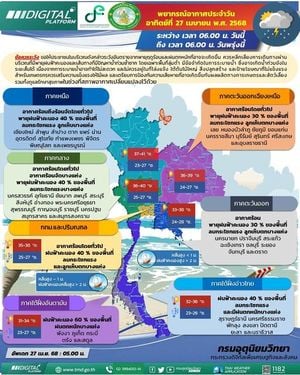Spain's government has set new minimum wage levels for 2025, marking a significant rise as the country grapples with economic challenges. On February 10, 2025, the Minister of Labor and Economy, Yolanda Díaz, along with leaders from major trade unions, signed off on the agreement to increase the Salario Mínimo Interprofesional (SMI) by 4.4%, raising it from 1,134 euros to 1,184 euros monthly. This marks an increase of 50 euros, with the new wage expected to benefit approximately 2.1 million workers across Spain.
The new minimum wage will take effect retroactively from January 1, 2025, meaning many employees will see adjustments reflected on their paychecks soon after the official announcement. According to the Ministry of Labor, this increase not only enhances worker earnings but is also aimed at mitigating the impact of inflation and rising living costs on the most vulnerable sectors of the population.
“This is good news for our country, as it strengthens the purchasing power of those who need it most,” stated Yolanda Díaz during the signing ceremony. The increase is seen as part of the government's commitment to ensuring the minimum wage equals 60% of the national average salary, fulfilling Europe’s Social Charter guidelines.
Despite this victory for labor groups, significant opposition remains from employers. The Confederation of Spanish Employers' Organizations (CEOE), which participated in negotiations, declined to endorse the final agreement, arguing the raise is too steep amid prevailing economic conditions. Their proposed increase of 3.4% was considered insufficient by the government and trade unions.
This wage increase adds approximately 700 euros more annually for those on minimum wage, bringing total annual earnings to approximately 16,576 euros before taxes. For workers compensated on the 12-pay system, monthly salaries rise to about 1,381.33 euros. Especially noteworthy is the fact the monthly daily wage is now pegged at 39.46 euros, compared to last year's 37.80 euros.
Analyzing the demographic impact, trade union assessments indicate the majority of minimum wage earners are women, who make up 57% of this group. The wage hike is particularly beneficial for younger employees, ages 16 to 34 years, about 17.2% of whom will see increases due to this new regulation. The change is viewed as instrumental in bridging the gender pay gap, as 15.6% of women will receive more pay compared to only 8.9% of men.
CCOO, one of the prominent unions supporting this initiative, has pointed out the historical rise since 2018, when the monthly minimum wage was just 735 euros. Over recent years, the SMI has surged by over 61%, signifying the government's sustained commitment to workers' rights amid broader economic reforms.
While most view this wage rise positively as it aims to improve the living standards of many, concerns linger about its possible adverse effects on small and medium-sized enterprises (SMEs). Business representatives have voiced trepidations about the economic strains created by lifting wage levels without corresponding adjustments or compensations to mitigate rising operational costs.
One unresolved aspect of this process is whether the new minimum wage will remain exempt from Income Tax (IRPF). Historically, such measures have been tied to wage hikes, allowing workers with incomes at the lower threshold to remain exempt from taxation. Díaz has expressed her desire for this exemption to continue, but the decision falls under the Ministry of Finance, led by María Jesús Montero. The government's stance remains firm on ensuring fiscal policies align with labor enhancements.
“Our objective is not just to address the minimum wage but to underline the importance of ensuring fair compensation for all workers,” said Díaz, addressing potential fiscal adjustments and their linkage to public contracts to alleviate increased labor costs for businesses. The aim is to integrate wage increases with governmental contracts to shield firms from the heightened operational burden.
The French government is poised to ratify this wage hike on February 11, 2025, after which the new minimum wage will be officially documented and enforced via the Boletín Oficial del Estado (BOE). Workers affected by the new ruling can anticipate receiving additional retroactive compensation as part of their salaries.
Overall, the proposed changes signal significant progress for labor standards in Spain, aligning wages with broader economic realities, and aiming to provide greater financial security for workers. The discourse surrounding this agreement showcases the complex interplay between governmental initiatives, labor rights advocacy, and the balance needed to maintain stable economic growth.



